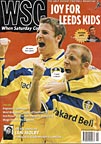 While seen as a grudge match in England, Uli Hesse-Lichtenberger reports on the Germans' relaxed attitude towards their supposed rivals
While seen as a grudge match in England, Uli Hesse-Lichtenberger reports on the Germans' relaxed attitude towards their supposed rivals
As usual, the best lines all came from the English. After the draw put England in the same group as Germany for the second time in five days (first the World Cup qualifiers, then the Euro 2000 finals), Kevin Keegan approached the German manager Erich Ribbeck and quipped: “Looks like we’ll be growing old together.” And the Sun came up with: “If we get the Germans a third time, can we keep them?” (Considering their track record, I’m not quite sure how they meant this, but it sounds good.)
In contrast, the most quote-worthy reaction in Germany was a lame England Again! from Kicker and the hollow statement: “England v Germany is a classic!” (Both Ribbeck and Franz Beckenbauer said so, which suggests Keegan not only has the better players but also a more capable ghostwriter.)
One feels tempted to argue this difference in tone and content is further proof that the people who gave you Richard Wagner and Hermann Hesse still haven’t learned how to loosen up. That, however, would miss the point. The main reason why the reaction to the draw was so subdued in Germany was very simply that almost everybody was far more interested in how the English were going to react. The memories of the “Tanks and Fritz, Krauts and Blitz” headlines that sprang up during Euro 96 are still fresh, which is why the German media mainly sat back after the draws and uneasily waited for the English tabloids to go into overdrive. In fact, I found the quotes from Keegan and the Sun mentioned above on a German teletext page entirely devoted to what the English had to say.
There are two reasons for this relative coolness with which Germans treat games against England. Both may shock many English readers, but there’s no denying it. The first is that this country is not nearly as militaristic and obsessed with the war as it is made out to be, and this holds true even with regard to the gutter press. The infamous Bild, for instance, very rarely falls back upon martial imagery.
The second reason is, plainly, that England v Germany means a lot more to the English than to the Germans. In the build-up to France 98, an English magazine asked me talk to the German internationals at Borussia Dortmund about the possibility that the two sides would meet in the quarter-finals. When I approached the players about the prospect of facing their old rivals, they all gave me a blank stare – they simply didn’t know which team I meant. “There’s no rivalry between England and Germany,” Stefan Reuter explained. “It’s a tradition-laden match, and the games have always been close, but that’s all.”
I also spoke to Paul Breitner, a member of the first German team to win in England (in 1972), who went a step further: “When we played England, we found them to be very dogged and uptight. Sometimes we felt they came close to cracking up. We always tried to use their over-motivation to our advantage.”
The bitter truth is probably that there are so many people who hate Germans with a passion that a German footballer, not to mention a German football fan, has to make the choice between treating basically every single game as a do-or-die derby – or becoming professional about it.
Historically, France is Germany’s arch enemy, not England. And France has a football score to settle, too: Germany eliminated them from the World Cup in both 1982 and 1986. Or what about Belgium? They were invaded by Germany during the First World War and have never forgotten it – just ask PSV coach Eric Gerets, who was a member of the Belgium team that lost the Euro 80 final to Germany. He really did “crack up” during PSV’s Champions League game with Bayern. Then there is Holland. Rudi Völler’s incredulous look when Frank Rijkaard spat at him during Italia 90 perfectly summed up what Simon Kuper wrote about this rivalry: “The Dutch hysteria rather bewilders the Germans.”
And so the main topic of conversation in Germany after the second draw was not so much “England again” but the realisation that the team could no longer count on one of its proverbial virtues – the luck of the draw. Even the Italian Nevio Scala said: “This is a tough group. Luck has deserted the Germans.” I wonder if he was aware that an English translation of his statement would have to contain another term borrowed from the military.
From WSC 156 February 2000. What was happening this month